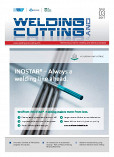"Reduced Gap Technology" (RGT) challenges conventional joint design principles
In narrow gap welding, the groove angle
is typically less than 20° instead of the normal
45 to 60°. This decreases the number
of weld passes needed to complete the
joint, and it reduces the welding time and
the consumption of filler material. It also
makes the material less prone to distortion.
In other words, reducing the groove volume
has a multitude of positive effects on welding
quality, efficiency and productivity.
However, reducing the groove angle also
brings more challenges to welding. In a
narrow groove, the welding arc is difficult
to control. This may result in quality issues,
unless the user invests in welding torch and
accessories that are specially designed for
the application.
An active subscription enables you to download articles or entire issues as PDF-files. If you already are a subscriber, please login. More information about the subscription









